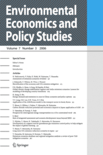
Environmental Economics and Policy Studies
Scope & Guideline
Navigating the Complexities of Environmental Economics
Introduction
Aims and Scopes
- Environmental Policy Analysis:
The journal emphasizes rigorous analysis of environmental policies, exploring their effectiveness, efficiency, and economic impacts on various sectors. - Sustainable Development:
Research often focuses on strategies for achieving sustainable development goals, examining how economic policies can align with environmental sustainability. - Impact of Climate Change:
A core area of research includes the economic impacts of climate change, assessing adaptation strategies and mitigation policies. - Energy Economics:
The journal covers topics related to energy production and consumption, including the economic implications of transitioning to renewable energy sources. - Behavioral Economics in Environmental Contexts:
It explores how behavioral economics influences environmental decision-making and policy acceptance, using experimental and survey methodologies. - Resource Management:
Research includes economic approaches to managing natural resources sustainably, such as water and biodiversity management.
Trending and Emerging
- Green Transformation and Innovation:
Recent publications have increasingly focused on the role of innovation in facilitating green transformations, particularly in energy sectors and urban settings. This trend underscores the need for innovative solutions to mitigate environmental impacts. - Interdisciplinary Approaches to Environmental Economics:
There is a growing trend towards interdisciplinary research that integrates economics with fields such as ecology, sociology, and political science, enhancing the depth and breadth of environmental studies. - Geopolitical Impacts on Environmental Policies:
Emerging research explores how geopolitical issues, such as conflicts and trade agreements, influence environmental policies and green finance, reflecting the interconnectedness of global challenges. - Behavioral Insights into Environmental Choices:
The journal has seen an uptick in studies applying behavioral economics to understand how individuals and communities make environmental choices, emphasizing the importance of psychological factors in policy design. - Climate Change Mitigation Strategies:
There is a strong focus on innovative strategies for climate change mitigation, including carbon pricing mechanisms and renewable energy policies, as researchers seek effective solutions to reduce greenhouse gas emissions.
Declining or Waning
- Traditional Economic Growth Models:
There has been a noticeable decrease in research focused solely on traditional economic growth models without integrating environmental considerations, reflecting a broader shift towards sustainability. - Single-Factor Environmental Impacts:
Research that examines environmental impacts in isolation, without considering interconnections with social or economic factors, has become less prevalent. - Conventional Industrial Pollution Studies:
Studies centered on conventional pollution from industries without exploring innovative solutions or policy implications are observed to be declining. - Static Environmental Valuation Techniques:
The use of static methods for valuing environmental resources has waned as researchers increasingly adopt dynamic and integrated approaches. - Focus on Localized Case Studies:
There appears to be a decreasing emphasis on localized case studies without broader implications, as the journal shifts towards studies with global relevance.
Similar Journals
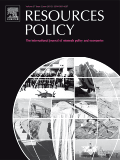
Resources Policy
Empowering Interdisciplinary Insights in Resource ManagementResources Policy, published by ELSEVIER SCI LTD, is a prestigious journal that has been at the forefront of advancing knowledge in the fields of Economics, Law, and Sociology since its inception in 1974. With an impressive Q1 ranking in multiple disciplines—including Economics and Econometrics, Law, Management, Monitoring, Policy and Law, and Sociology and Political Science—this journal showcases high-impact research and insights that are vital for academics, policymakers, and practitioners alike. With Scopus rankings placing it in the top percentiles of its respective categories, Resources Policy fosters interdisciplinary dialogue, promoting innovative solutions and policies concerning the sustainable management and use of resources. While currently not an open-access publication, the journal ensures that its rich content is accessible to those pursuing rigorous research and professional excellence. As we approach its 50th anniversary in 2024, Resources Policy continues to be an essential platform for critical discussions, evaluation, and advancements in resource management.
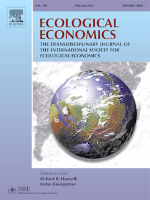
ECOLOGICAL ECONOMICS
Exploring the Intersections of Ecology and Economics.ECOLOGICAL ECONOMICS, published by ELSEVIER, stands as a premier journal dedicated to the integration of ecological and economic thinking, exploring the complex interactions between human and natural systems. With an impactful history dating back to 1989, the journal has solidified its position in the academic community, evidenced by its classification in the top quartiles (Q1) of both Economics and Econometrics and Environmental Science categories for 2023. ECOLOGICAL ECONOMICS boasts impressive Scopus rankings, holding the 32nd position out of 716 in Economics and Econometrics and 19th among 233 in General Environmental Science, reflecting its substantial influence and reach. Although it does not currently offer open access options, the journal remains a vital resource for researchers, professionals, and students interested in sustainable development, environmental policy, and resource management. The ongoing convergence of various fields within ecological economics promises to yield valuable insights and foster interdisciplinary collaboration, making this journal an essential component of scholarly discourse.

Empirical Economics
Advancing empirical insights for impactful economic policy.Empirical Economics, published by PHYSICA-VERLAG GMBH & CO in Germany, is an esteemed journal in the field of economics that has been disseminating high-quality research since its inception in 1976. With an impressive convergence of studies that extends to 2024, the journal occupies notable positions within various academic categories, achieving a Q2 ranking in Economics and Econometrics and Statistics and Probability, and a commendable Q1 ranking in Mathematics (miscellaneous) and Social Sciences (miscellaneous) as of 2023. The journal stands out for its interdisciplinary approach, evidenced by its Scopus ranks that place it in the top percentiles across multiple sections, including the 86th percentile in both Mathematics and Social Sciences rankings. While currently not an open access journal, Empirical Economics serves as a pivotal platform for researchers, professionals, and academics seeking to engage with empirical methodologies that drive contemporary economic analysis and policy formulation. Its commitment to disseminating significant findings in the rapidly evolving landscape of empirical economic research makes it a must-read for anyone interested in the interplay between data and economic theory.

American Economic Journal-Economic Policy
Innovating Discussions on Policy ImpactAmerican Economic Journal - Economic Policy, published by the American Economic Association, stands at the forefront of economic research, focusing on significant policy implications and evidence-based evaluations. With an ISSN of 1945-7731 and an E-ISSN of 1945-774X, this esteemed journal has maintained its influence and credibility in the field since its inception in 2009. Ranked in the Q1 category for Economics, Econometrics and Finance and ranking #7 out of 288 in Scopus, it boasts a remarkable 97th percentile ranking, making it a premier source for cutting-edge research and policy discussion. The journal's rigorous peer-reviewed articles aim to bridge the gap between academic research and real-world economic policy, serving as an essential resource for researchers, professionals, and students who seek to engage with and contribute to the evolving landscape of economic policy. With open access options not currently available, readers are encouraged to subscribe or access articles through academic institutions for comprehensive insights into the economic challenges and innovations shaping our world.

Indian Journal of Economics and Development
Exploring Contemporary Challenges in Economics and DevelopmentIndian Journal of Economics and Development, published by SOC ECONOMICS & DEVELOPMENT, stands as a noteworthy platform for scholarly discourse in the fields of economics, business management, and development studies. With an ISSN of 2277-5412 and an E-ISSN of 2322-0430, this journal, based in Ludhiana, India, has been dedicated to advancing research and dialogue since its inception in 2019 and is poised for convergence until 2024. Although currently ranked in the Q4 categories across various disciplines in Business, Management and Accounting, Economics and Econometrics, and Geography, Planning and Development, the journal’s commitment to fostering impactful research is evident in its wide-ranging aims and scope, which seek to explore contemporary economic challenges and developmental issues. While the journal operates without an open-access model, it provides a valuable resource for academics and professionals, and encourages contributions that address both theoretical and empirical questions. Researchers, students, and professionals will find this journal critical as it serves a vital role in the dialogue surrounding economic and developmental dynamics, particularly in an increasingly complex global landscape.

International Journal of Ecological Economics & Statistics
Advancing Sustainable Insights through Ecological Economics.The International Journal of Ecological Economics & Statistics is a critical platform for research in the intersecting fields of ecological economics and statistical analysis. Published by the CENTRE ENVIRONMENT SOCIAL & ECONOMIC RESEARCH (PUBL-CESER), this journal aims to promote scholarly discussion and knowledge dissemination regarding sustainable economic practices and quantitative research methodologies. Despite the discontinuation of its coverage in Scopus, the journal continues to play a significant role in enhancing the understanding of the economic aspects of environmental issues within a global context. Researchers and professionals engaged in the fields of economics, decision sciences, and environmental studies are particularly invited to contribute and stay updated with the latest findings and theories. With its commitment to fostering academic discourse, the journal aspires to bridge the gap between environmental sustainability and economic growth, equipping readers with essential insights for future applications.
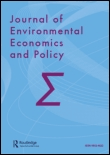
Journal of Environmental Economics and Policy
Driving Change with Economic Perspectives on Environmental IssuesThe Journal of Environmental Economics and Policy, published by Routledge Journals, Taylor & Francis Ltd, serves as a premier platform for researchers, policymakers, and scholars focused on the interlinkages between environmental issues and economic principles. With an ISSN of 2160-6544 and an E-ISSN of 2160-6552, this esteemed journal has achieved a commendable positioning in the academic community, securing a Q2 rating in key fields such as Economics and Econometrics, Environmental Science, and Management, Monitoring, Policy, and Law as of 2023. The journal has consistently been ranked in the upper tiers of its categories, reflecting its impact and relevance in contemporary environmental discussions. Operating from the United Kingdom, this journal is dedicated to publishing high-quality research articles, reviews, and case studies that contribute to the understanding of economic strategies in environmental governance and policy-making. With an address at 2-4 Park Square, Milton Park, Abingdon OX14 4RN, Oxon, England, it invites contributions that address pressing ecological challenges through an economic lens, fostering an interdisciplinary dialogue crucial for sustainable development. Although not an open access journal, it remains influential in shaping policies and practices that align economic growth with environmental sustainability.

POLITICKA EKONOMIE
Navigating Contemporary Issues in Political EconomyPOLITICKA EKONOMIE is a prominent academic journal published by VYSOKA SKOLA EKONOMICKA in the Czech Republic, focusing on the intersection of economics, sociology, and political science. Established to foster critical discourse within these fields, the journal's ISSN is 0032-3233, and it operates with an E-ISSN of 2336-8225. With a convergence history dating back to 1980, POLITICKA EKONOMIE has become a valuable resource for researchers and practitioners seeking insights into societal and economic dynamics. Although the journal is categorized in Quartile 4 for both Economics and Econometrics and Sociology and Political Science categories as of 2023, it continues to contribute significantly to empirical research and theoretical advancements. Researchers will find that while the journal is not open access, it welcomes submissions that engage with contemporary issues and debates, thereby promoting academic exchange and innovation in the social sciences.
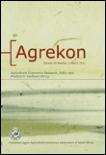
Agrekon
Advancing Agricultural Insights for Economic GrowthAgrekon, published by ROUTLEDGE JOURNALS, TAYLOR & FRANCIS LTD, serves as a premier academic platform in the fields of Agronomy, Economics, and Geography, with a focus on the intersection of agricultural practices and economic development. With an ISSN of 0303-1853 and an E-ISSN of 2078-0400, this esteemed journal boasts a commendable academic standing, reflected in its 2023 quartile rankings of Q2 in Agronomy and Crop Science and Geography, Planning and Development, and Q3 in Economics and Econometrics. Established in 1962 and running through 2024, Agrekon continues to be a vital resource for researchers, professionals, and students committed to advancing knowledge in sustainable agricultural practices, economic policies, and spatial development issues. The journal is not open access, yet its findings and discussions are highly regarded within the academic community, offering insights that drive innovation and inform policy decisions across the globe. Engaging with Agrekon equips scholars with a rich compendium of research that bridges theoretical knowledge and practical application in the agricultural and economic sectors.
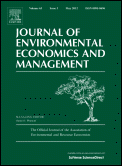
JOURNAL OF ENVIRONMENTAL ECONOMICS AND MANAGEMENT
Shaping Sustainable Solutions Through Scholarly Insight.JOURNAL OF ENVIRONMENTAL ECONOMICS AND MANAGEMENT, published by Academic Press Inc Elsevier Science, stands as a leading platform for scholarly discourse at the intersection of environmental economics and management. Established in 1974 and continuing through 2024, the journal targets key issues in environmental policy, management strategies, and economic implications of environmental challenges, catering to an extensive audience of researchers, professionals, and students. It boasts a prestigious Q1 ranking in both Economics and Econometrics and Management, Monitoring, Policy and Law for 2023, underscoring its significant contribution to the field. Additionally, with outstanding Scopus rankings—placed in the 88th percentile for Economics and Econometrics and the 82nd percentile for Environmental Science—the journal is recognized for its rigorous peer-reviewed research. Although it follows a subscription model, the insights gained from its comprehensive articles are invaluable for addressing today’s pressing environmental and economic challenges.